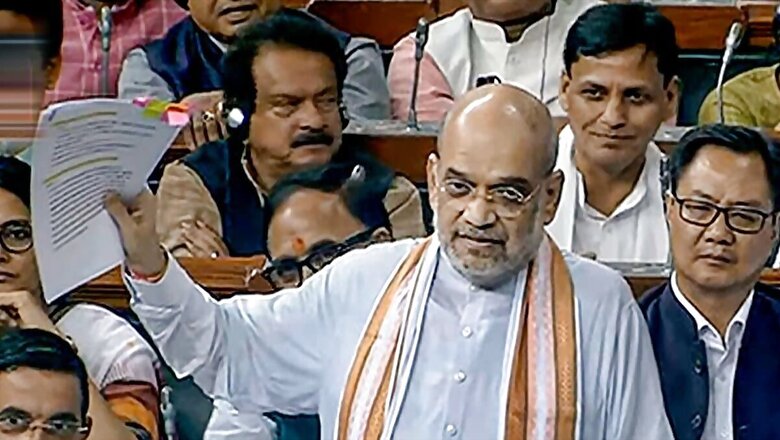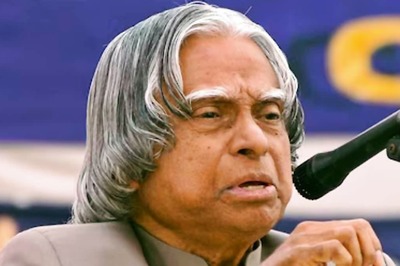
views
Even as the Bharatiya Nyaya Sanhita (BNS) Bill, 2023 is being vetted by the Parliament’s standing committee, debates and deliberations continue over the proposed section of the bill, specifically Section 150, which will replace Section 124A of IPC, known as sedition.
Serving and retired police officers, who studied the structure of the proposed sections in the BNS, say sections 145 and 150 look like old wine in a new bottle and are primarily based on the existing structure of the sedition law. Experts call the proposed section 150 for the “acts endangering sovereignty, unity and integrity of India” as “Sedition 2.0”.
Union home minister Amit Shah, while presenting the proposed BNS in Parliament, said sedition would be repealed. But a detailed analysis of the proposed sections reveal that the name has been changed, not the structure. Sedition has always been associated with monarchy or with the crown and it was introduced by the British.
Explaining the proposed section 145 and 150 of BNS, a senior officer serving in home ministry said hatred, contempt, and disaffection against the government was an offence under the British rule. In fact, the new bill has tightened the noose for those who even have the intention of waging war against the government.
With the implementation of this rule, even if anyone conspires, or collects arms and ammunition will have to face severe punishment. “For example, if A is preparing to wage war against the government and B is aware of it or conceals the information, knowing that it will help A, he will have to face severe action,” the senior officer added. The official also said even if any gesture, speech, or text does not incite violence but excites or even attempts to excite, then also it will attract offences against the state.
Reservations Regarding the New Law
There are diverse views among the IPS officers about the proposed sections.
The precise difference between section 124 A of IPC and proposed section 150 of BNS would be about the articulation of the section and how it is more stringent than before.
The proposed section will give less discretion to the judiciary to dismiss a case, said a senior IPS officer of the DG rank.
“Desirability is a crucial element in this. In policy that is the most important. Desirability must be drawn to serve the purpose for various stakeholders. Judiciary cannot be prime mover in this since these provisions are meant to protect the national security; the only standard one can apply is reasonable freedom that upholds individual’s rights without breaching security,” he said.
“Here, the state is important, more so, in the view of impending vulnerabilities — inside and outside, with ever increasing ingenuity in design and modus operandi of the adversaries — added and abetted by a host of foreign states,” the senior officer explained saying that the funding, logistics and actors all have been made punishable whether acting from or of the country. Also, President and Governors have been safeguarded.
Why does ‘endangering sovereignty’ look like sedition 2.0?
According to the IPC, section 124A or sedition says, “Whoever, by words, either spoken or written, or by signs, or by visible representation, or otherwise, brings or attempts to bring into hatred or contempt, or excites or attempts to excite disaffection towards the government established by law in India, shall be punished with imprisonment for life, to which fine may be added, or with imprisonment which may extend to three years, to which fine may be added, or with fine. “By the expression disaffection means “disloyalty and all feelings of enmity”.
In the proposed BMS, in place of a section 124A, there are several sections for “waging war against the government of India”. Section 145 is for “waging, or attempting to wage war, or abetting waging of war, against the Government of India” according to the section, “Whoever wages war against the Government of India, or attempts to wage such war, or abets the waging of such war, shall be punished with death, or imprisonment for life and shall also be liable to fine. ”
The proposed section 150 of BMS says, “Whoever, purposely or knowingly, by words, either spoken or written, or by signs, or by visible representation, or by electronic communication or by use of financial mean, or otherwise, excites or attempts to excite, secession or armed rebellion or subversive activities, or encourages feelings of separatist activities or endangers sovereignty or unity and integrity of India; or indulges in or commits any such act shall be punished with imprisonment for life or with imprisonment which may extend to seven years and shall also be liable to fine.”
Sedition slammed by Supreme Court
The data published by the National Crime Record Bureau last year stated that 242 cases of sedition were lodged between 2019 and 2021.
The act has been heavily criticised by all quarters — legal, political and social. In July, 2022, a three-judge division bench of the Supreme Court, led by Chief Justice NV Ramana, put the sedition law on hold and urged the Centre and state governments to refrain from lodging FIRs under Section 124A (sedition) of the Indian Penal Code until the Centre re-examines its provisions.
Justice Ramana further said the persons, who were languishing in jail in pending sedition cases, could approach the courts and seek bail while the British-era law was under re-consideration.
The court observed that the “rigors of Section 124A of IPC was not in tune with the current social milieu” and was intended for a time when India was under the colonial regime.
“This Court is cognizant of the security, interests and integrity of the state on one hand, and the civil liberties of citizens on the other. There is a requirement to balance both sets of considerations, which is a difficult exercise,” the judgment read.
Commenting on the proposed law, another senior government officer said, “Even though the name has been changed, the provisions have become more stringent. This is to ensure that no one even thinks of waging war against the government.”




















Comments
0 comment